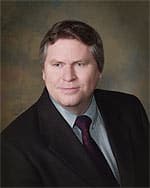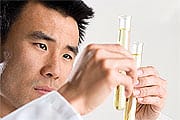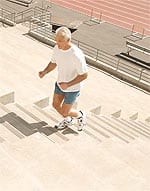Life Extension Magazine®
A favorable trend has emerged whereby researchers today are measuring blood levels of ingested nutrients to ascertain how much are really absorbed into the human body. An example of the value of this can be seen in recent vitamin D studies. It turns out that some people only need 1,000 IU a day of supplemental vitamin D to achieve optimal blood status, whereas others require 5,000 IU to 10,000 IU daily.1-6 CoQ10 Blood Levels in Heart Failure PatientsPeter Langsjoen, MD, is considered the world’s foremost expert in the use of CoQ10 to treat cardiac disease. He conducts his research and clinical practice in Tyler, Texas.
When the ubiquinol form of CoQ10 was introduced last year, Dr. Langsjoen and his associates were curious to investigate whether it could reverse the course of advanced congestive heart failure. Along with his pioneering father, Dr. Langsjoen had observed that patients with advanced heart failure often failed to achieve adequate blood (plasma) levels, even when high doses of conventional CoQ10 were used.7 Dr. Langsjoen found that in response to the administration of 900 mg of conventional ubiquinone CoQ10, advanced heart failure patients only increased their total CoQ10 levels to less than 2 mcg/mL of blood. Congestive heart failure patients with CoQ10 blood levels as low as this respond poorly, with very little improvement in ejection fraction (a test that measures the heart’s pumping capacity).8 In healthy people, the ingestion of 900 mg of conventional (ubiquinone) CoQ10 is expected to raise total blood levels to around 3 mcg/mL. Dr. Langsjoen postulated that the reason ubiquinone fails to significantly increase CoQ10 blood levels in critically ill patients is the impaired absorption caused from the intestinal and liver edema they so often suffer. Comparing CoQ10 Blood LevelsIn order to ascertain the effects of ubiquinol, Dr. Langsjoen identified patients with advanced congestive heart failure who had been taking 450 mg/day of ubiquinone, but whose mean total plasma CoQ10 blood level was only 1.4 mcg/mL. All of these patients were then changed to 450 mg/day of ubiquinol. The results showed that ubiquinol increased mean plasma CoQ10 levels up to 4.1 mcg/mL (or 2.92-fold greater than ubiquinone).8 A review of previous studies indicates that significant clinical benefit in heart failure patients requires a plasma CoQ10 level of around 4 mcg/mL.9-11 In severe heart failure patients, the only way these higher levels can be obtained appears to be with ubiquinol—not conventional ubiquinone CoQ10 supplements.
Comparing Improvements in Cardiac FunctionThe ejection fraction test assesses the heart’s pumping capacity by measuring how much blood is pumped after each beat compared with the amount of blood remaining in the heart. Healthy people have an ejection fraction of 50-75%, while those with congestive heart failure often have values below 20-30%.12
In the study conducted by Dr. Langsjoen, the ejection fraction improved from 24% up to 45% in ubiquinol-treated patients who had follow-up echocardiograms. This represented a recovery of up to 88% in this critical measurement of cardiac output. The higher blood levels of CoQ10 and the improved ejection fractions were accompanied by a remarkable clinical improvement in these heart failure patients.8 Based on the findings from this study, Dr. Langsjoen’s group concluded: “It is our preliminary observation that ubiquinol has dramatically improved absorption in patients with severe heart failure and that the improvement in plasma CoQ10 levels is strongly correlated with both clinical improvement and improvement in measurement of left ventricular function.”8 Why Congestive Heart Failure Deaths are IncreasingCongestive heart failure currently strikes five million Americans.13 Most victims are over 65, an age when cardiac muscle CoQ10 levels are sharply depleted (by as much as 72%) compared with youth.14 Each year, about one million Americans are hospitalized because of congestive heart failure and nearly 53,000 die directly from it.15 A predicted increase in heart failure mortality can be attributed to several factors, including obesity-diabetes, more people surviving heart attacks (with heart muscle damage), and an aging population. As one can see from the chart on the next page, normal aging causes a severe depletion of CoQ10 in tissues throughout the body,14,16,17 which helps explain why older people suffer more congestive heart failure. An even more insidious reason why more cardiac patients are dying from congestive heart failure is the prescribing of statin drugs without sufficient CoQ10 intake. Since statin drugs deplete CoQ1018 synthesis in the body, one can easily see why congestive heart failure deaths are skyrocketing in those being aggressively treated by mainstream cardiologists. Those at high risk for heart disease (such as diabetics) and those who have survived a heart attack often need to be prescribed a statin drug to reduce additional coronary artery occlusion. These statin drug users also need to supplement with an adequate amount of CoQ10 to protect against the cardiac cell energy depletion that is the underlying cause of congestive heart failure. Multiple Advantages of Ubiquinol Over UbiquinoneLast year, we provided what we thought was irrefutable evidence of the multiple advantages of the ubiquinol form of CoQ10. Compared with conventional ubiquinone CoQ10, ubiquinol was shown to absorb into the bloodstream up to eight times better,20-22 reduce fatigue 90% more effectively,28 and slow aging in middle-aged mice 40% better.19 Some commercial supplement companies, however, told their customers that all they had to do was take more ubiquinone to obtain the same benefits of ubiquinol. Commercial companies had a self-serving reason for sticking with ubiquinone—their profit margins on it were significantly higher. We at the Life Extension Foundation take a different view. Keeping our members in a youthful state of longevity is the most efficient way of maintaining the revenue stream we need to fund our scientific research projects. We had no problem reducing our margins to provide members with the clearly superior ubiquinol form of CoQ10. Dr. Langsjoen’s remarkable findings that high-dose ubiquinone was ineffective for advanced heart failure patients, whereas ubiquinol reversed the course of the disease, provide the most conclusive evidence to date of the superiority of ubiquinol CoQ10.
Fascinating History of CoQ10In this issue of Life Extension magazine, we publish an insider’s look at the 50-year history of CoQ10 that describes the initial skepticism and the subsequent discoveries made by scientists who fastidiously persevered against the conventional dogma of the day (see page 57). You’ll be amazed as to how much painstaking cardiovascular research went into providing us with the wealth of CoQ10 data we now have today. We also publish in this issue, an update on new studies showing the combination of CoQ10 (and other nutrients) with conventional therapies improves treatment outcomes in advanced breast cancer and melanoma cases (see page 44). Based on the research that exists to date, you may be as startled as I am that oncologists are failing to tell certain cancer patients to take high-dose CoQ10. Help Combat Today’s Leading Cause of DeathIt is so regrettable that the major cause of death in the Western world is medical ignorance. There are five million Americans suffering from congestive heart failure today, and most of them don’t take any CoQ10. Those that do mostly take the antiquated ubiquinone form that provides very little benefit in advanced cases.
The Life Extension Foundation compiles and publishes avant-garde scientific information and first disseminates it to members. We then provide it to the world (via the Internet) at no charge. If more cardiologists paid attention to what we published last year about ubiquinol, a significant percentage of those who died from congestive heart failure in 2007 could still be alive. Every time you purchase a product from us, you contribute directly to aggressive life-extension research that could save enormous numbers of human lives. For 20 consecutive years, members have taken advantage of the annual Super Sale to stock up on a large supply of advanced natural products at reduced prices. During this annual winter event, every Life Extension product is discounted to enable members to enjoy huge savings on our top-of-the-line supplements. This year’s Super Sale ends on January 31, 2008. I encourage members to check their personal supplies and stock up during this one-time-a-year price reduction.
For longer life,
William Faloon | ||||||||||||||||||||||
| References | ||||||||||||||||||||||
| 1. Lappe JM, Travers-Gustafson D, Davies KM, Recker RR, Heaney RP. Vitamin D and calcium supplementation reduces cancer risk: 2. Heaney RP, Davies KM, Chen TC, Holick MF, Barger-Lux MJ. Human serum 25-hydroxycholecalciferol response to extended oral dosing with cholecalciferol. 3. Vieth R, Chan PC, MacFarlane GD. Efficacy and safety of vitamin D3 intake exceeding the lowest observed adverse effect level. 4. Vieth R. Vitamin D supplementation, 25-hydroxyvitamin D concentrations, and safety. Am J Clin Nutr. 1999 May;69(5):842-56. 5. Zeghoud F, Delaveyne R, Rehel P, et al. Vitamin D and pubertal maturation. Value and tolerance of vitamin D supplementation during the winter season. 6. Galpern WR, Cudkowicz ME. Coenzyme Q treatment of neurodegenerative diseases of aging. Mitochondrion. 2007 Jun;7 Suppl:S146-53. 7. Langsjoen H, Langsjoen P, Langsjoen P, Willis R, Folkers K. Usefulness of coenzyme Q10 in clinical cardiology: a long-term study. 8. Langsjoen P. 5th Annual International CoQ10 Symposium. Kobe, Japan: November 9-12, 2007. 9. Langsjoen PH, Langsjoen AM. Overview of the use of CoQ10 in cardiovascular disease. Biofactors. 1999;9(2-4):273-84. 10. Langsjoen PH, Littarru GP, Silver MA. Role of concomitant coenzyme Q10 with statins for patients with hyperlipidemia. 11. Langsjoen PH, Langsjoen AM. Coenzyme Q10 in cardiovascular disease with emphasis on heart failure and myocardial ischaemia. 12. Available at: http://www.hearthelp.com/diseases/ejection-fraction.html. Accessed November 7, 2007. 13. Available at: http://www.americanheart.org/presenter.jhtml?identifier=1486. Accessed November 7, 2007. 14. Rosenfeldt FL, Pepe S, Ou R, et al. Coenzyme Q10 improves the tolerance of the senescent myocardium to aerobic and ischemic stress: 15. Available at: http://www.americanheart.org/presenter.jhtml?identifier=3024579. Accessed November 7, 2007. 16. Hoppe U, Bergemann J, Diembeck W, et al. Coenzyme Q10, a cutaneous antioxidant and energizer. Biofactors. 1999;9(2-4):371-8. 17. Kalén A, Appelkvist EL, Dallner G. Age-related changes in the lipid compositions of rat and human tissues. Lipids. 1989 Jul;24(7):579-84. 18. Folkers K, Langsjoen P, Willis R, et al. Lovastatin decreases coenzyme Q levels in humans. Proc Natl Acad Sci USA. 1990 Nov;87(22):8931-4. 19. Yan J, Fujii K, Yao J, et al. Reduced coenzyme Q10 supplementation decelerates senescence in SAMP1 mice. Exp Gerontol. 2006 Feb;41(2):130-40. 20. Hosoe K, Kitano M, Kishida H, et al. Study on safety and bioavailability of ubiquinol (Kaneka QH) after single and 4-week multiple oral administration to healthy volunteers. Regul Toxicol Pharmacol. 2007 Feb;47(1):19-28. 21. Shults CW, Oakes D, Kieburtz K, et al. Effects of coenzyme Q10 in early Parkinson disease: evidence of slowing of the functional decline. Arch Neurol. 2002 Oct;59(10):1541-50. 22. Shults CW, Flint BM, Song D, Fontaine D. Pilot trial of high dosages of coenzyme Q10 in patients with Parkinson’s disease. Exp Neurol. 2004 Aug;188(2):491-4. 23. Young AJ, Johnson S, Steffens DC, Doraiswamy PM. Coenzyme Q10: a review of its promise as a neuroprotectant. CNS Spectr. 2007 Jan;12(1):62-8. 24. Sharma SK, El Refaey H, Ebadi M. Complex-1 activity and 18F-DOPA uptake in genetically engineered mouse model of Parkinson’s disease and the neuroprotective role of coenzyme Q10. Brain Res Bull. 2006 Jun 15;70(1):22-32. 25. Smith KM, Matson S, Matson WR, et al. Dose ranging and efficacy study of high-dose coenzyme Q10 formulations in Huntington’s disease mice. Biochim Biophys Acta. 2006 Jun;1762(6):616-26. 26. Beal MF. Mitochondrial dysfunction and oxidative damage in Alzheimer’s and Parkinson’s diseases and coenzyme Q10 as a potential treatment. J Bioenerg Biomembr. 2004 Aug;36(4):381-6. 27. Shults CW. Coenzyme Q10 in neurodegenerative diseases. Curr Med Chem. 2003 Oct;10(19):1917-21. 28. Anti-fatigue effect in rats. Unpublished data, Kaneka Corp. | ||||||||||||||||||||||






